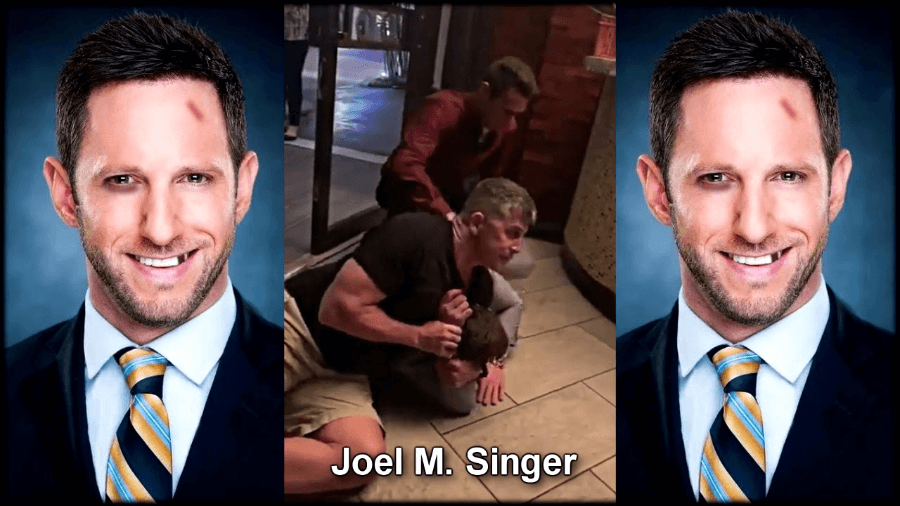📑Table of Contents:

Joel Michael Singer didn’t aim to be famous. He wasn’t a celebrity, influencer, or public figure. But in one moment, captured by a smartphone camera, he became an internet villain.
The footage showed him headbutting a restaurant employee in Fort Lauderdale, Florida. Within hours, the clip spread everywhere. Social media branded him with a new identity. And despite his attempts to fight back, the internet held on tight.
Here’s how a viral outburst turned into a permanent online scar.
Who Was Joel Michael Singer?
Before July 2019, Joel Michael Singer lived a quiet, relatively anonymous life. He reportedly worked in finance—some sources claim he was employed at Coastal Wealth, a financial services firm based in Florida.
Several online bios described him as well-educated. He had a business degree and possibly an MBA. A few websites even listed him as a neurosurgeon. However, searches of medical license databases yielded no results. That claim appears to be unsubstantiated.
What we do know is this: he had a good job, a clean reputation, and no prior reason to be recognized in public.
Then came the viral video.
The Headbutt That Made Him Go Viral
On a summer night in 2019, Singer was dining at YOLO, a popular restaurant in Fort Lauderdale. Details about what triggered the confrontation are murky. But one version, widely accepted online, says that Singer was asked to leave after allegedly punching someone.
A staff member confronted him near the exit. Security footage and bystander videos show what happened next: Singer suddenly headbutted the man. Immediately, a bystander named Steven Heflin stepped in. He grabbed Singer in a tight headlock and brought him to the ground.
The situation escalated, but Heflin kept him restrained until police arrived. No one was seriously injured. But the clip—less than a minute long—had already begun its journey across Twitter, Reddit, and YouTube.
The Video Spreads—and the Internet Reacts
The video spread like wildfire. On Reddit’s r/PublicFreakout and r/IAmTheMainCharacter, users dissected the footage frame by frame. They called the Singer entitled. Arrogant. Aggressive. The headbutt became a meme. Screenshots turned into GIFs. Comments poured in by the thousands.
It wasn’t just the act that angered people—it was his behavior afterward. As Singer struggled to escape the headlock, he allegedly shouted threats and insisted that people didn’t know who he was. That only fueled the rage.
Almost overnight, Joel Michael Singer became a symbol of unchecked privilege.
The Attempt to Disappear
Rather than ride out the controversy, Singer fought back—legally. He purchased the copyright to the viral video. He then issued takedown notices to websites, YouTubers, and even Reddit posts. His goal was simple: erase the clip from the internet.
But that move only made things worse.
The so-called “Streisand effect” kicked in. The harder he pushed to remove the footage, the more it spread. People reposted it in defiance. They criticized him not just for the headbutt, but for trying to silence public reaction.
The narrative shifted again—now, he wasn’t just an aggressor. He was someone trying to rewrite reality.
Questions Around His Identity
In the months that followed, questions swirled about who Singer was.
Some social media profiles listed him as a neurosurgeon. Yet investigations by amateur sleuths and journalists found no record of a Joel Michael Singer in medical registries. This casts doubt on everything.
Others insisted he worked in finance, particularly at a South Florida firm. That seemed more plausible, though his LinkedIn presence vanished quickly after the video.
In response, new bios and content appeared across various platforms—most of which were vague, brief, or lacked any substantial information.
The Unsung Hero: Steven Heflin
Meanwhile, attention shifted to Steven Heflin, the man who intervened. He wasn’t a bouncer or MMA fighter. Just a civilian. In interviews, Heflin said he acted instinctively to protect others. He kept a calm demeanor during the scuffle and avoided unnecessary force.
Online, people praised him. Some called him “the headlock hero.” Others joked he should run for office. While Singer’s reputation crumbled, Heflin’s rose.
He’s since gone quiet—but the internet remembers him fondly.
Legal Outcome
Despite the violent act captured on video, no criminal charges were filed against Singer. Police were called, but no arrest followed. Many speculated that his connections helped him avoid legal consequences. Others believed the situation was too minor for prosecution.
Either way, the law let it go. The internet didn’t.
Life After the Viral Moment
Since 2019, Singer has tried to vanish. He’s stayed out of the spotlight. He doesn’t give interviews. His online profiles are hidden or deleted. But the video still lives on. So do the comments. And the memes.
Every so often, the clip resurfaces during discussions about viral justice or social accountability. Singer has become an example of what not to do in public. His name is now a cautionary tale.
What This Story Says About Modern Reputation
Joel Michael Singer’s downfall didn’t come from a trial or a news exposé. It came from one minute of footage, filmed by a stranger.
In today’s world, the image is fragile. One mistake can follow you forever. And if your response is to silence, rather than apologize, the backlash often grows.
Singer didn’t just assault someone. He also tried to erase it. That move—some say—did more damage than the headbutt itself.

Final Thoughts
The story of Joel Michael Singer is more than a viral moment. It’s about ego, accountability, and the internet’s unforgiving memory.
He went from a quiet professional to a viral anti-hero in the blink of an eye. His reputation collapsed under the weight of public judgment—and his reactions.
In the end, he learned a hard truth: online, you can’t always control the story. Sometimes, the story controls you.





